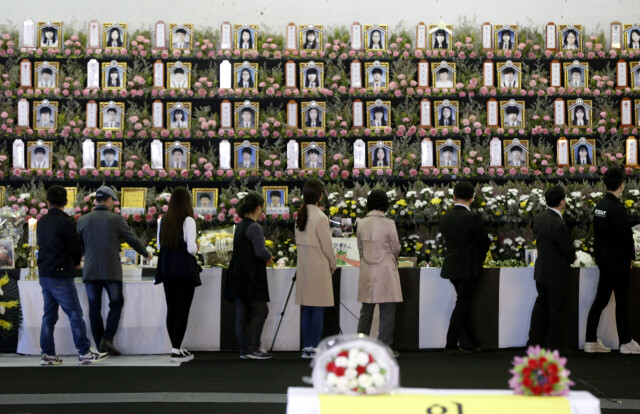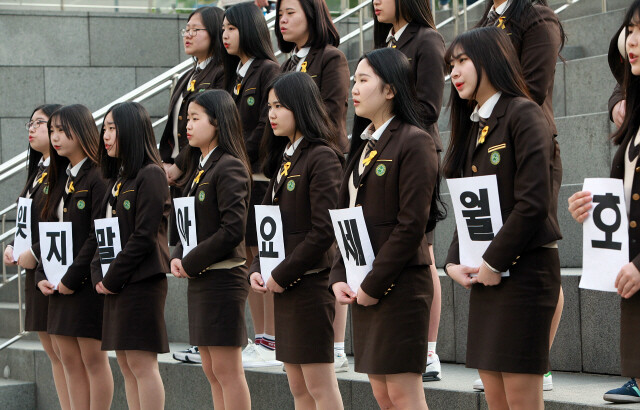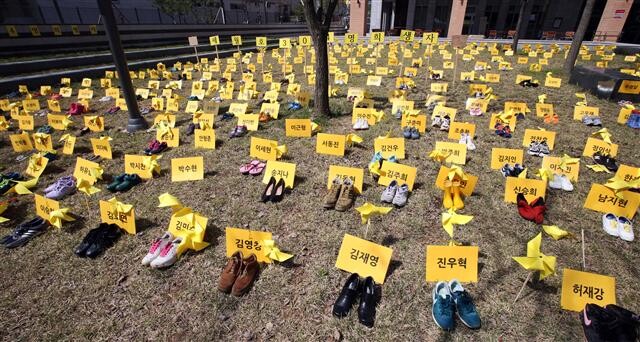hankyoreh
Links to other country sites 다른 나라 사이트 링크
In poll, 80% of S. Koreans say for them, Sewol tragedy is “still ongoing”

Two years after the Sewol ferry sinking claimed 304 lives, South Koreans are still feeling a whirlwind of emotions.
A recent survey by the Hankyoreh showed eight out of ten respondents saying the tragedy was “still in progress” for them and lamenting the fact that the memories and the earnestness of the tragedy's’s investigation have not been sustained in society as a whole. Meanwhile, signs of avoidance and helplessness are becoming more and more evident as the debate over the investigation continues.
The Hankyoreh conducted an poll to see how the Sewol is remembered by South Koreans on the second anniversary of the tragedy, which occurred on Apr. 16, 2014. Working with the Hankyoreh Economy and Society Research Institute’s social research center, it designed a survey that was administered late last month to 1,006 adults aged 19 and older, in what is effectively the first-ever investigation of the public’s emotions on the tragedy.
The findings showed 79.9% of respondents describing the Sewol sinking as “an in-progress tragedy that society needs to resolve.” Three out of four (75.7%) said they continue to think of the incident “sometimes or often.” The strong message was the people still remember the Sewol - and, indeed, are unable to forget.
At the same time, respondents openly confessed to “Sewol fatigue,” with just over half - 53.5% - saying they “would like to forget.” The results show mixed emotions on the disaster: the desire to forget, but an inability to do so.
Distrust in the state remained strong, with just 27% of respondents saying they trusted the state to guard their life and safety in all situations. Distrust was highest among respondents in their thirties and forties, with just 7% of the former and 12.9% of the latter saying they had faith in the state’s role.
Most respondents agreed the current administration investigation of the sinking has been inadequate. Just one out of five respondents agreed that the investigation was “thorough” and “regarded nothing as off-limits.” The administration and President Park Geun-hye were mentioned by 42.8% as the most difficult to trust with the investigation, followed by the Minjoo Party of Korea (TMPK) and political opposition (11.4%), the media (11%), the ruling Saenuri Party (NFP, 5.4%), and judiciary (4.0%); 24.2% gave a response of “don’t know.”
When asked how often they usually think about the Sewol tragedy, 75.7% of respondents said they think about it frequently or occasionally, while 20.7% said that they do not think about it very often. There were also 3.5% who said they do not think about it at all.

The areas with the most respondents who said that they think about the tragedy were Gwangju and the southwest Jeolla region where that city is located. Considering that the Sewol sank in the waters off Paengmok Port in Jindo, South Jeolla Province, it is to be surmised that people in the area have unusually strong feelings about the Sewol tragedy.
Respondents' attitudes toward society as a whole differed from their assessment of themselves. The percentage of respondents who thought that South Koreans are doing a good job of remembering the Sewol tragedy (49%) was similar to those who thought that it was not (48.7%). In other words, people think that they themselves have not forgotten the tragedy but that the mood in society as a whole is otherwise.

The majority of respondents agreed that the Sewol tragedy case is ongoing and that the truth of the case has yet to come out. 79.9% of respondents agreed that the Sewol tragedy is a continuing incident that South Korean society has yet to resolve.
Among respondents in their 30s and 40s, more than 90% agreed with this statement, while the least agreement was found among respondents who were 60 years or above (57.2%).
Only 18.5% of respondents thought that the Sewol tragedy should be thought of as being in the past since it happened two years ago.
Questions asking respondents how they feel about the Sewol tragedy revealed their conflicted emotions. The survey measured the intensity of four different emotions that respondents felt when they thought about the tragedy.
When respondents were asked to what extent they feel anger, frustration, cynicism and a desire to forget, the results were as follows: frustration (89.8%), anger (87.3%), cynicism (71.4%) and the desire to forget (53.5%). This means that, even though two years have passed since the tragedy, an absolute majority of South Koreans have been unable to shake their feelings of frustration and anger.
Also notable is the fact that more than half of respondents honestly admitted that the Sewol tragedy prompted feelings of cynicism and a desire to forget. A closer look at respondents who feel a desire to forget shows that a similar number feel that way strongly (25.1%) and weakly (28.4%).
The implication is that, while 75% of respondents believe that they have not forgotten about the Sewol tragedy, they simultaneously are experiencing cognitive dissonance, wanting not to think about it or to forget about it.
This aspect of the survey suggests that members of South Korean society feel a considerable amount of fatigue and helplessness about the Sewol tragedy.
"It appears that South Koreans feel sadness and trauma about the Sewol tragedy but are unable to conceive of any specific ways or plans for resolving this problem," said Kim Hong-jung, a professor of sociology at Seoul National University. "This contradictory mixture of memory and forgetfulness is an expression of the so-called 'learned helplessness,' the idea that these problems cannot be solved rationally, that has pervaded South Korean society since the mid-2000s."
The survey can be interpreted as showing a complex dynamic of conflicting emotions, including disappointment about the government and politicians' passive approach to getting to the bottom of the tragedy and a sense of responsibility that this is a problem that South Korean society really needs to address, along with an exhaustion that makes people want to stop remembering the tragedy or to just stand on the sidelines.
There were many respondents who thought that South Korean society has not changed very much even after the Sewol tragedy. When asked whether South Korean society has been moving in a better direction since the tragedy, an overwhelming number of respondents were neutral or pessimistic, saying that little has changed from before (71.4%) or that it is moving in a worse direction than before (14.9%). Only 10.2% of respondents were optimistic, saying that South Korean society is moving in a better direction than before.
By Kim Sung-hwan, staff reporter
Please direct questions or comments to [english@hani.co.kr]

Editorial・opinion
![[Guest essay] The real reason Korea’s new right wants to dub Rhee a founding father [Guest essay] The real reason Korea’s new right wants to dub Rhee a founding father](https://flexible.img.hani.co.kr/flexible/normal/500/300/imgdb/original/2024/0423/8317138574257878.jpg) [Guest essay] The real reason Korea’s new right wants to dub Rhee a founding father
[Guest essay] The real reason Korea’s new right wants to dub Rhee a founding father![[Column] ‘Choson’: Is it time we start referring to N. Korea in its own terms? [Column] ‘Choson’: Is it time we start referring to N. Korea in its own terms?](https://flexible.img.hani.co.kr/flexible/normal/500/300/imgdb/original/2024/0423/3617138579390322.jpg) [Column] ‘Choson’: Is it time we start referring to N. Korea in its own terms?
[Column] ‘Choson’: Is it time we start referring to N. Korea in its own terms?- [Editorial] Japan’s rewriting of history with Korea has gone too far
- [Column] The president’s questionable capacity for dialogue
- [Column] Are chaebol firms just pizza pies for families to divvy up as they please?
- [Column] Has Korea, too, crossed the Rubicon on China?
- [Correspondent’s column] In Japan’s alliance with US, echoes of its past alliances with UK
- [Editorial] Does Yoon think the Korean public is wrong?
- [Editorial] As it bolsters its alliance with US, Japan must be accountable for past
- [Guest essay] Amending the Constitution is Yoon’s key to leaving office in public’s good graces
Most viewed articles
- 1[Column] ‘Choson’: Is it time we start referring to N. Korea in its own terms?
- 2Senior doctors cut hours, prepare to resign as government refuses to scrap medical reform plan
- 3Why Korea shouldn’t welcome Japan’s newly beefed up defense cooperation with US
- 4Opposition calls Yoon’s chief of staff appointment a ‘slap in the face’
- 5[Guest essay] The real reason Korea’s new right wants to dub Rhee a founding father
- 6Terry Anderson, AP reporter who informed world of massacre in Gwangju, dies at 76
- 7[Column] The clock is ticking for Korea’s first lady
- 8[Editorial] Japan’s rewriting of history with Korea has gone too far
- 9New AI-based translation tools make their way into everyday life in Korea
- 10Survey: S. Koreans spend more time using smartphones than eating